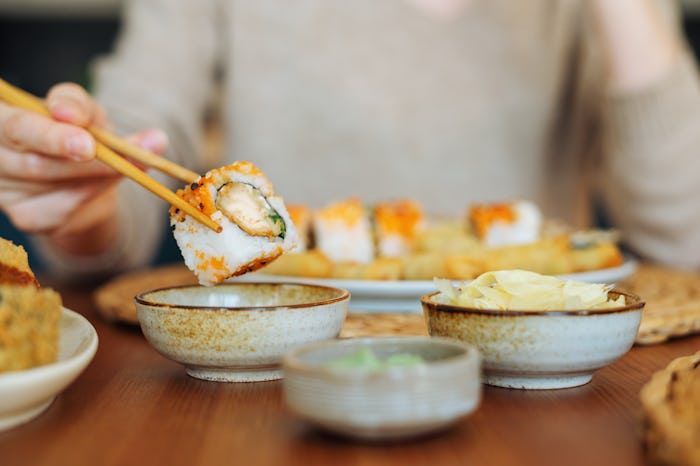Pregnancy

Here's Why You Should Stay Away From Sushi When You're Pregnant, According To Experts
Better safe than sorry.
Pregnancy comes with more warnings than a first day in driver’s ed class. The list of things pregnant people can and cannot do (see: no alcohol, no raw eggs, no unwashed produce, no caffeine) goes on and on and on. But in the midst of these red flags some pregnant people wonder, are all of these legit? Like, why can’t pregnant women eat sushi?
For good reason, Dr. Lawrence Stitt, an OB-GYN at Director of Minimally Invasive Gynecological Surgery at the University of Maryland School of Medicine, tells Romper.
Why can’t pregnant women eat sushi?
So can you eat sushi when you’re pregnant? There’s a good reason why pregnant women can’t eat sushi.
“Pregnant women should not eat sushi because raw fish runs the risk of exposing the baby to bacteria,” says Dr. Stitt. The same goes for cold cuts. “No subs either,” Stitt adds.
And this rule starts immediately or even prior to becoming pregnant as the risk is that high. To avoid developmental complications, Dr. Stitt urges pregnant women just to give up (as tough as it might be) their favorite sashimi or nigiri for the duration of their pregnancy.
Is cooked fish OK for pregnant women to eat?
Yes, cooked fish is fine, says Stitt, provided it’s fully cooked and reaches an internal temperature of 165 degrees at minimum.
Seafood can be a good form of nutrition for pregnant women provided they avoid fish high in mercury. Great options include salmon, herring, anchovies, canned light tuna, and shrimp.
But with all of the above, pregnant women should never consume these types of seafood in a raw form to avoid bacteria, mercury, and even potential parasites.
It may come as a shock, but “intestinal parasitic worms affect more than 2 billion people worldwide according to the World Health Organization. And if an expectant mother picks up one of these nasty parasites, the results can be detrimental to the fetus. “The main impact of a fish-borne parasitic infection on pregnant women is anemia and altered immunity, which may increase the risk of a maternal infection,” according to a survey in Obstetrical & gynecological. “The primary fetal effects include intrauterine growth restriction and preterm delivery,” the report goes on to say.
Is the short-term reward of a great bite of sushi worth risking your baby’s health? Hardly. So save the sushi feast for after your little one has been delivered and enjoy the spread all the more.
Expert
Dr. Lawrence Stitt, OB-GYN, Director, Minimally Invasive Gynecological Surgery, Adjunct Faculty Instructor Department of Reproductive Sciences at the University of Maryland School of Medicine
Studies
Villazanakretzer, D. L., Napolitano, P. G., Cummings, K. F., & Magann, E. F. (2016). Fish Parasites: A Growing Concern During Pregnancy. Obstetrical & gynecological survey, 71(4), 253–259. https://doi.org/10.1097/OGX.0000000000000303
This article was originally published on